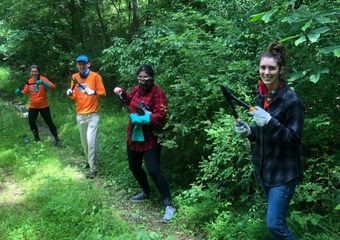6 New Year’s Resolutions for Backpackers and Thru-Hikers
New year, new plans. 2020 may have been the life goals-equivalent of getting hit in the face by a water balloon full of warm, chunky trash juice, but there’s still hope for 2021. As we celebrate another trip around the sun, hikers everywhere are laying out goals and gearing up to hit the trail this year.
But hiking, especially long-distance hiking, takes planning and commitment. It’s a lot of work to make our outdoor dreams come true in the best of times. And now, some ten months into the pandemic, it’s more complicated than ever before. So without further ado, here are six New Year’s resolutions for backpackers and thru-hikers to kickstart your 2021 hiking prep.
6 New Year’s Resolutions for Backpackers and Thru-Hikers
1. Don’t catch and/or spread a deadly pandemic to vulnerable, isolated communities.

Photo via.
Just sayin’, it’s the elephant in the room. After almost a year of struggle and sacrifice, the vaccine is finally rolling out. But we’re not out of the woods yet. The pandemic is still raging, and it’s likely to be exacerbated by holiday travel in the coming weeks. Life is unlikely to return to normal before this summer (at the earliest). If you’re planning on hiking this year—especially long-distance hiking that will require resupply—you must keep the pandemic foremost in your mind.
- Be prepared: Bring a mask and hand sanitizer.
- Six feet: Maintain social distance at all times.
- Be extra cautious in town: Think about your strategy for staying safe on resupply runs and zero days.
- Avoid crowds, even outside: Avoid crowded trails and campsites and hike when there are fewer people around.
- Register: If you’re planning on hiking the AT, register your trip so you can choose a quieter start date and opt in to notifications from the ATC.
2. Leave No Trace.

Photo via.
The OTHER elephant in the room. America’s hiking trails are becoming more popular (and crowded) with each passing year. Unfortunately, with increased foot traffic often comes worsening environmental degradation. Whether you’re planning to trek for a few days or a few months, commit to learning and following the seven Leave No Trace principles so that our beautiful natural spaces can persist for years to come. You can even take things a step beyond Leave No Trace by striving to leave the backcountry better than you found it. Specific, actionable New Year’s resolutions for backpackers:
- Poop responsibly: Pack out your toilet paper (or use a backcountry bidet).
- Leave it better than you found it: Pick up at least three pieces of trash each day you’re on the trail.
- Carry the Ten Essentials: Put together a kit containing the Ten Hiking Essentials and bring them with you on EVERY hike, even the short ones.
- Store your food correctly: Practice your bear bagging skills—the PCT hang is most effective—and commit to hanging your food or storing it in a bear-resistant canister every night you spend on trail.
- Sniff out invasives: Learn to identify common invasive species in the region you’re hiking in and report any sightings to land managers.
3. Give back.
It takes a lot of work to build and maintain hiking trails, much of it volunteered. Trail maintainers make the backcountry safer and more pleasant for users while also providing meaningful ecological services like erosion control and invasive species removal. If you love to hike, then you’ve likely been the beneficiary of numerous hours of donated labor and extensive financial investment. Pay it forward by joining a trail crew near you. If this isn’t feasible, consider donating to a local trail organization. There are other ways to give back, such as leading guided hikes for fellow community members, volunteering for search and rescue organizations, and participating in citizen science studies.
- Trail work: Join or support a trail maintenance organization.
- Hiking clubs: Facilitate guided hikes for community members or hiking clubs.
- Help scientists gather data: Participate in citizen science studies.
- Be an advocate: Take political action on behalf of public lands and wild spaces.
- Express your gratitude: Thank volunteers every time you see them.
4. Learn about trailside natural history.

Photo via.
Studying the names and properties of common flora, fauna, rocks, and minerals you might encounter on the trail can add meaning and context to your hikes. Learning about the human history of the local area where you’re hiking can be similarly enriching. In this way, otherwise monotonous days in the green tunnel can become exciting scavenger hunts. And no matter where you are, you’ll get a more profound experience of the trail than you otherwise would. Apps like iNaturalist and PeakFinder make it easy to learn about local species and geography, respectively. If you’re not ultralight, you can also carry a pocket field ID guide with you and try to identify at least one thing every day or every time you take a break.
- Read: Check out a book (or two) about the human or natural history of the area you love to hike in.
- Learn to identify at least one new species on every hike: Or at least one per week on longer hikes.
- Learn to read a topographic map: You’d be surprised how much a map can teach you about an area.
5. Set a mileage goal and stick to it.

Photo via.
There’s no better way to train for hiking than by—that’s right—actually hiking. Whether you’re aspiring to complete a multi-thousand-mile thru-hike or just want to get regular exercise in the great outdoors this year, setting specific, concrete goals will help motivate you to hit the trail. Here are some tips:
- Give yourself regular checkpoints and deadlines. For instance: rather than saying, “I’m going to hike 240 miles this year,” say, “I’m going to hike 20 miles every month.”
- Be as specific as possible. Take time to outline how many miles you want to hike each week or month and pick some trails or areas you’d like to explore. If you’ll need to plan ahead to make your hike happen (like hitting a particular health milestone, taking time off work, or purchasing new gear), outline this in your plan, too. This exercise will also help get you excited about the endeavor!
- Tell everyone about your goal. Your friends and family will help hold you accountable.
6. Develop healthy habits both on and off trail.

Photo via.
Cliché? Perhaps. New Year’s resolutions among backpackers already trend toward the health-conscious end of the spectrum, and with good reason. If you’re serious about taking on the rigors of trail life this year, you should be committed to investing in your mental and physical health before, during, and after your hike. This includes simple stuff like drinking more water and eating things other than Snickers and ram-bombs. But it also includes developing healthy, mindful habits that will help you reap the full mental health benefits of time spent in nature (and help you cope with post-trail blues when you return home). Ideas:
- Hydrate: Drink a liter of water for every hour you spend hiking. Making sure to drink at the beginning and end of the day and every time you stop for a break.
- Eat right: Even when you’re in the throes of hiker hunger and all that’s available is gas station snacks for resupply, you can still incorporate whole foods like nuts, cheese, and jerky into your diet instead of (or at least in addition to) junk food.
- Stretch: Every day. Your body will thank you. Try hiking for an hour to warm your muscles up and then stopping for a 15-minute pack-off break to stretch (don’t forget to drink water while you’re stopped!) or doing a quick yoga routine in camp at the beginning or end of the day.
- Practice gratitude: For nature, for your health, etc. On the tough days, “practice gratitude” might just be a cute way of saying “embrace the suck.” This exercise will help you to appreciate your hike to the fullest. It will also help prepare you for the mental challenges of reintegrating into civilized life post-trail. Journaling and meditating can facilitate the habit of practicing gratitude.
What are some of your backpacking or thru-hiking New Year’s resolutions? We’d love to hear about them in the comments below.
Featured image: Graphic design by Sophie Gerry.
This website contains affiliate links, which means The Trek may receive a percentage of any product or service you purchase using the links in the articles or advertisements. The buyer pays the same price as they would otherwise, and your purchase helps to support The Trek's ongoing goal to serve you quality backpacking advice and information. Thanks for your support!
To learn more, please visit the About This Site page.




Comments 1
Kelly,
Excellent, and quite applicable for those of us who are looking at yet another postponement of a thru-hike.
Number 11 might be, if decide to postpone your thru-hike, set alternative hiking goals. I’m looking closely at the Finger Lakes Trail in New York.
Blessings,
Steve / pearwood